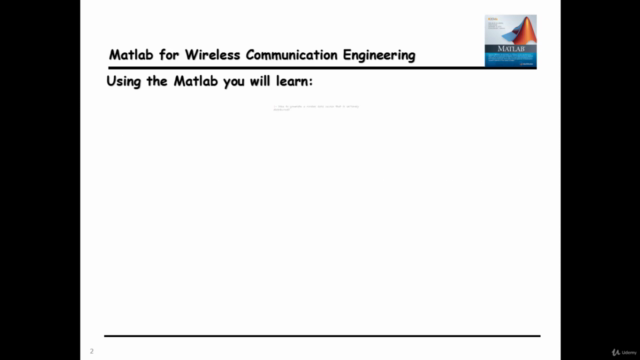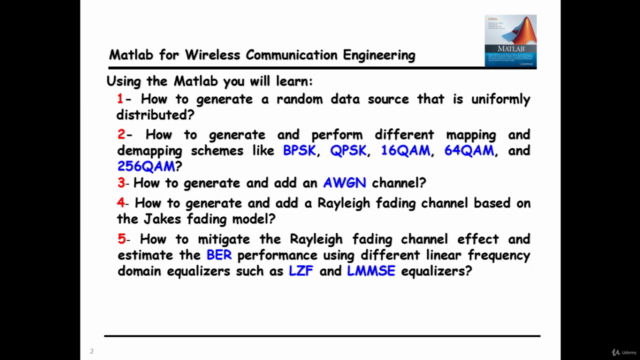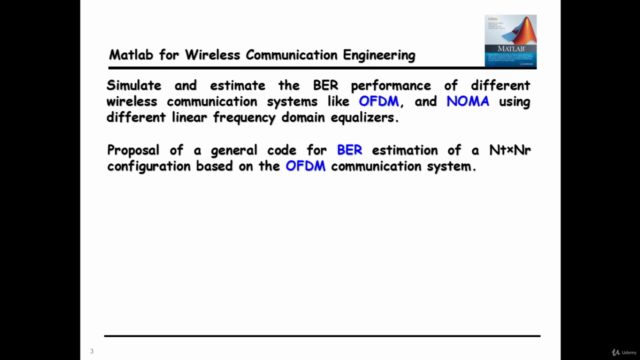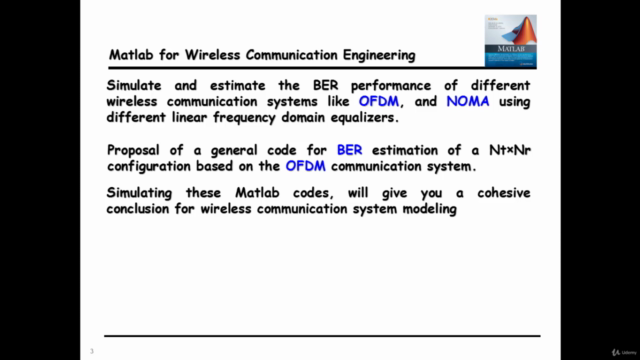Matlab course for wireless communication engineering

Why take this course?
🎓 Course Title: Mastering Wireless Communication Systems with MATLAB: From BPSK to NOMA
🛠️ Headline: A Step-by-Step Guide to MATLAB Codes for BER Estimations in OFDM and NOMA Communication Systems
Course Overview:
Embark on a comprehensive journey through the fascinating world of wireless communication with our specialized Matlab course. This meticulously crafted course is tailored for undergraduate and postgraduate students in the electronics and communication engineering department, offering a treasure trove of knowledge that would typically take months to master. 🧰✨
With a total of 10 comprehensive introductions, each spanning 30 minutes, this course not only delves into the theoretical underpinnings but also provides visual insight through detailed simulated figures. These sessions are designed to facilitate a deeper understanding and practical application of Matlab in estimating Bit-Error-Rate (BER) for various communication systems.
What You Will Learn:
🔍 Estimating BER Performance:
- Understand the impact of different modulation schemes, including BPSK, QPSK, 16QAM, 64QAM, and 256QAM over an Additive White Gaussian Noise (AWGN) channel.
- Learn how to simulate and analyze these modulation schemes in Matlab.
🌊 Rayleigh Fading Channel:
- Generate a Rayleigh fading channel using the Jakes model within your Matlab code.
- Explore techniques to counteract the effects of Rayleigh fading using linear equalizer schemes.
🛠️ Mitigating Signal Distortion:
- Discover methods to mitigate signal distortion caused by the channel and enhance system performance.
👀 BER Performance in OFDM Systems:
- Estimate BER performance over a Single-Input-Single-Output (SISO) Orthogonal Frequency Division Multiplexing (OFDM) communication system.
- Understand how to handle a Rayleigh fading channel in an OFDM system.
☫ MIMO Systems:
- Extend your knowledge to Multiple-Input-Multiple-Output (MIMO) configurations, including 2×2 and 3×3 MIMO-OFDM systems.
🔁 Generalized BER Estimation for OFDM:
- Achieve a versatile Matlab code capable of estimating BER in an OFDM communication system with Nt transmitting antennas and Nr receiving antennas over a Rayleigh fading channel.
🚀 Advanced Technologies:
- Explore the cutting-edge technology of Non-Orthogonal Multiple Access (NOMA) used in 5G communication systems and its BER estimation.
Why Take This Course?
This course is more than just a set of instructions; it's a comprehensive guide that will empower you with the skills to effectively analyze and simulate various wireless communication systems using MATLAB. By the end of this course, you'll have a robust understanding of BER estimation techniques, which are crucial for designing and optimizing modern communication systems.
Whether you're a student, researcher, or engineering professional, this course will provide you with the practical knowledge and tools necessary to succeed in the rapidly evolving field of wireless communications. 🚀📚
Enroll now and unlock the potential of MATLAB in your projects! 💻✅
Course Gallery




Loading charts...